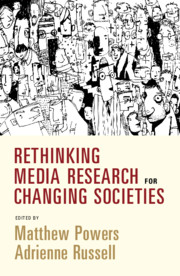Rethinking Media Research for Changing Societies
This agenda-setting volume brings together leading scholars of media and public life to grapple with how media research can make sense of the massive changes rocking politics and the media world. Each author identifies a 'most pressing' question for scholars working at the intersection of journalism, politics, advocacy, and technology. The authors then suggest different research approaches designed to highlight real-world stakes and offer a path toward responsive, productive action. Chapters explore our 'datafied' lives, journalism's deep responsibilities and daunting challenges, media's inclusions (and non-inclusions), the riddle of digital engagement, and the obligations scholars must attempt to meet in an era of networked information. The result is a rich forum that addresses how media transformations carry serious implications for public life. Original, provocative, and generative, this book is international in its orientation and makes a compelling case for public scholarship.
- Provides diverse theoretical treatments to help guide communication researchers
- Addresses historical roots of current scholarly concerns, while engaging in novel issues brought into focus by contemporary developments in politics, technology, and culture
- Offers scholars a set of issues and questions to spur new research topics
Reviews & endorsements
'By convening a rich set of scholars, ideas, methods, and stakes, Powers and Russell offer not only a compelling and actionable interdisciplinary image of contemporary media research, but also a roadmap for how to understand and shape media for years to come. This collection helps you think in new ways, with admirable clarity, depth, and creativity.' Mike Ananny, Associate Professor of Communication and Journalism, USC Annenberg
'Rethinking Media Research for Changing Societies is an innovative and multi-vocal provocation for media scholars to be better activists of their own work. Read it as a guide to what matters now, and what is going to be important in the years to come. An immensely valuable resource for scholars, students, and the media.' Zizi Papacharissi, Professor and Head of the Communication Department and Professor of Political Science, University of Illinois at Chicago
'What does scholarly engagement look like in current times? Bringing together leading media scholars of journalism, politics and activism, this book offers a pathway to making sense of academe in today’s difficult world. Engaging with critical issues like inclusion, difference, freedom, engagement, normativity, adaptation and datafication, the book demonstrates that scholars must lead the way in embracing them more fully if public life is to improve.' Barbie Zelizer, Raymond Williams Professor of Communication, University of Pennsylvania
‘an insightful contribution to the discourse on media research.’ Yangge Zhang, International Journal of Communication
Product details
August 2020Adobe eBook Reader
9781108889636
0 pages
This ISBN is for an eBook version which is distributed on our behalf by a third party.
Table of Contents
- 1. Introduction
- Matthew Powers and Adrienne Russell
- Part I. Living in a Datafied World
- 2. The corporate reconfiguration of the social world Nick Couldry
- 3. Public communication in a promotional culture Melissa Aronczyk
- Part II. Journalism in Times of Change
- 4. Press freedom and its context Daniel Hallin
- 5. What are journalists for today? Matthew Powers and Sandra Vera-Zambrano
- 6. Noise and the values of news Stephanie Craft and Morten Stinus Kristensen
- Part III. Media and Problems of Inclusion
- 7. Journalism and inclusion Rodney Benson
- 8. Afrotechtopolis: how computing technology maintains racial order Charlton McIlwain
- 9. Exploiting subalternity in the name of counter-hegemonic communication: Turkey's global media outreach initiatives Bilge Yesil
- Part IV. Engagement with and through Media
- 10. Constructive engagement across deep divides – what it entails and how it changes our role as communication scholars Hartmut Wessler
- 11. Fostering engagement in an era of dissipating publics Lynn Schofield Clark
- Part V. The Role of Scholars
- 12. What is communication research for? Wrestling with the relevance of what we do Seth C. Lewis
- 13. Communication as translation: notes toward a new conceptualization of communication Guobin Yang
- 14. What are we fighting for? Academia or the humility of knowledge Nabil Echchaibi
- Epilogue: what media for what public life? Silvio Waisbord.




